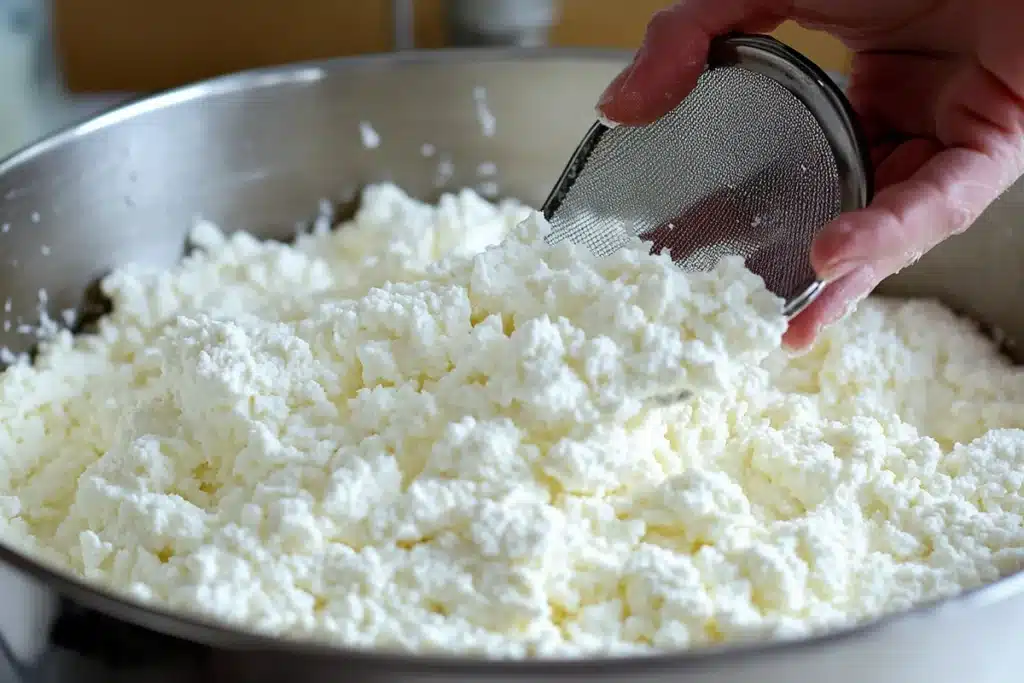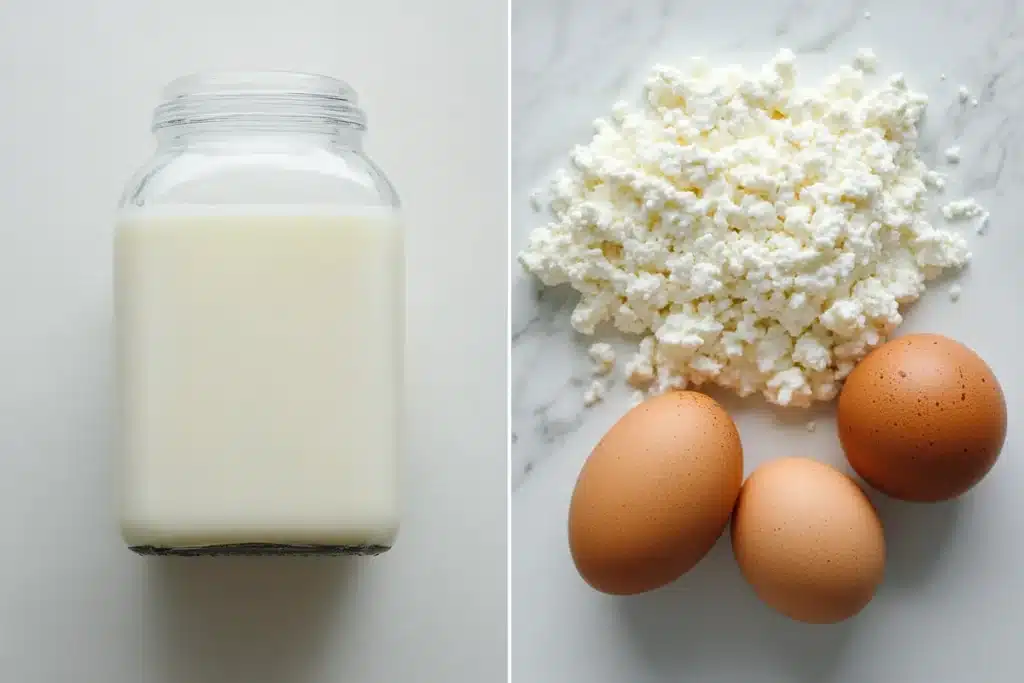Curious about what does cottage cheese do to eggs? This article explores the effects of cottage cheese on eggs.
The question of what does cottage cheese do to eggs is often asked by those who enjoy combining these foods. Cottage cheese can alter the texture and taste of eggs. This article explores those changes. We will look at the effects on texture, flavor, and nutrients. Ultimately, this will help you prepare great egg dishes that include cottage cheese, and it will allow you to better understand all of the opportunities.
Understanding the Composition of Cottage Cheese
Cottage cheese is a fresh cheese product. It is made from milk curds and whey. The curds are solid. The whey is liquid. Cottage cheese has a high water content. It also contains proteins. It has some vitamins and minerals. Knowing these components will help you understand its effect on eggs. Cottage cheese also has a slightly sour or tangy taste. This is why it changes the overall flavor of the eggs.
Curds, Whey, and Nutritional Content
The curds are the main solid portion. The whey is the liquid part. Additionally, cottage cheese has proteins, calcium, and riboflavin. These nutrients make it a healthy addition to eggs. The balance between solid and liquid affects your egg recipe. It also affects how the eggs will cook, and taste in the end.
How Cottage Cheese Affects Egg Texture
Cottage cheese can change the texture of eggs. It can make them creamier and more tender. However, if not handled correctly, it can also make them watery. The liquid in the cottage cheese can dilute the egg proteins. This changes the final texture. It can also affect the overall appearance. This is why the steps you take to combine the eggs and cottage cheese are so very important.
Creaminess, Tenderness, or Wateriness
Adding cottage cheese can enhance the creaminess of your eggs. This is attributable to the fat and proteins found within the cheese. However, if not handled properly, the liquid component can also cause eggs to become watery. The balance is very important. Therefore, learning to use cottage cheese correctly with eggs is key. Additionally, always using the freshest items will also lead to the best results.
How Cottage Cheese Alters Egg Flavor
In addition to texture, cottage cheese also alters the flavor of eggs. It introduces a mild, tangy taste, which offers a good contrast to the rich taste of eggs. This combination can be quite appealing, and it provides a new way to enjoy your eggs. Cottage cheese has a mild flavor and pairs well with savory ingredients. Using different types of cottage cheese will also affect the final flavor profile, impacting your egg dish.
Mild Tanginess and Complementary Flavors
The mild tang of cottage cheese offers a contrast to the taste of eggs. Consequently, this combination can create a flavor profile that is more balanced. Furthermore, this allows you to pair your eggs with other additions. It is best to use items that enhance, and do not overpower, the eggs and the cheese. These flavor choices create a very appealing combination.
Nutritional Benefits of Cottage Cheese and Eggs
Combining cottage cheese and eggs provides a good source of proteins. Additionally, it also contains calcium and vitamins. Eggs also have many good nutrients. Therefore, this combination creates a rich and healthy meal. It is also a great way to start your day. This will also make you feel full for a longer period.
Protein, Calcium, and Vitamins
Both eggs and cottage cheese are great sources of proteins. Cottage cheese also adds calcium. Eggs contain many vitamins and minerals. These components make for a nutritious meal. These two items together provide many healthy benefits. This makes this a very good breakfast or meal idea.
Preventing Watery Eggs with Cottage Cheese
To avoid watery eggs when using cottage cheese, start by draining the cheese. Remove as much liquid as possible. Then, when combining the eggs and cottage cheese, mix gently to avoid overmixing. This will prevent the further release of liquid. Also, be sure to avoid overcooking the eggs. These steps are key to preventing watery results and to creating a more enjoyable texture.

Draining Cottage Cheese and Gentle Mixing
Drain any excess liquid from cottage cheese. Use a sieve or strainer for that. Gently fold cottage cheese into your eggs. Avoid overmixing. This will cause the whey to release. These simple steps will help to keep your eggs from becoming watery. They also prevent your eggs from becoming too dense.
Cooking Techniques for Eggs and Cottage Cheese
Use medium heat when cooking your eggs with cottage cheese. High heat can cook them unevenly. It can also cause them to become watery. Cook your eggs until they are just set. Do not overcook them. These cooking methods will ensure a better outcome. You will also want to use a good non-stick pan. This will help to prevent the eggs from sticking.
Low to Medium Heat and Proper Cooking Time
Use low to medium heat for cooking. Cook until the eggs are set but not dry. Be sure you are not overcooking your eggs. These steps will help you cook them properly. They will also keep them from being watery. It will also help to maintain their nice texture and flavor.
Different Ways to Use Cottage Cheese with Eggs
Cottage cheese can be used with eggs in a variety of different ways. Scrambled eggs with cottage cheese is the most common method. You can also add cottage cheese to omelets as a filling. Additionally, you can explore using it in frittatas or quiches for a different twist. Cottage cheese is a flexible food and adds new flavor and texture to different egg recipes. This allows you to try different variations and explore new options.
Scrambled Eggs, Omelets, and Frittatas
Scrambled eggs with cottage cheese are a classic option. You can also add it to omelets as a filling. Try using cottage cheese in a frittata or a quiche for a tasty twist. These are all simple options to try. They also allow for great variations. They all enhance the taste and the nutrients.
Adding Other Ingredients to Eggs and Cottage Cheese
You can also add other items to your eggs and cottage cheese. Vegetables are a great addition. You can also use fresh herbs. You can even add a small amount of seasoning. These items can enhance flavor. You can add almost anything to this wonderful dish. You can also explore all the different options.

Vegetables, Herbs, and Seasoning Options
Add sautéed vegetables like mushrooms, onions, or spinach for added nutrients. Fresh herbs like chives or parsley will also enhance taste and visual presentation. Additionally, a pinch of salt and pepper is a great way to enhance the overall flavors. These additions can create wonderful and delicious results. These will also make your eggs even more interesting.
The Fluffiness Factor: Cottage Cheese and Eggs
Some people want their scrambled eggs to be fluffy. Cottage cheese can help, or hinder this outcome. If handled correctly, the proteins in cottage cheese will help make your eggs fluffier. It is also important to use the correct heat when cooking. This can help add to the overall fluffiness of the eggs.
Achieving Fluffy Texture: Combining Techniques
Keeping the heat low and stirring often will help promote a lighter texture. The proteins in cottage cheese can also aid in incorporating air, leading to fluffier eggs. Adding a small amount of milk or water to your egg mixture can further enhance this. By employing these techniques, you’ll notice an improvement in texture when you combine cottage cheese with your eggs.
Does Cottage Cheese Change the Taste of Scrambled Eggs?
Yes, cottage cheese changes the taste of scrambled eggs. It adds a mild tanginess. It also adds a creamy flavor and texture. The taste difference is notable. The creamy texture makes it very satisfying. However, the taste should be mild. Ultimately, it will enhance the flavor of your eggs.
Mild Tanginess and Increased Richness
The cottage cheese does make a difference in taste, but in a good way. It offers a more subtle flavor. It also creates a richer and more satisfying dish. You should never let that hold you back. This combination provides a great opportunity to add new and delicious flavors to a classic dish.
Substituting Cottage Cheese for Milk in Eggs
Can you substitute cottage cheese for milk in scrambled eggs? Yes, you can, but with caution. Cottage cheese provides moisture, like milk. However, it can also make your eggs more dense. Use it sparingly, and adjust to your liking. If you need extra moisture, consider a splash of water or milk.

Moisture and Density Considerations
Cottage cheese can be used instead of milk for moisture. However, it can make the eggs more dense. So, use a small amount of it. Use other liquids to adjust the consistency. These measures will help create a great and creamy result. It will also help avoid a dense texture.
How Do Restaurants Make Eggs So Fluffy?
How do restaurants make their scrambled eggs so fluffy? They often use high heat and constant stirring. They also use a good amount of fat like butter or cream. They may also use a sprinkling of baking powder or soda. These steps will create the best outcome. You can also use milk or water for extra fluffiness.
High Heat, Fat, and Air Incorporation
Restaurants use high heat to set the eggs quickly. They also use a good amount of butter or cream for richness. They also stir the eggs constantly to add more air. These tips will allow you to make perfect fluffy eggs. This will also give you an understanding of what makes a restaurant quality egg dish so delicious.
Frequently Asked Questions About Cottage Cheese and Eggs
Here are some frequent questions about cottage cheese and eggs:
Why does cottage cheese make my eggs watery?
Cottage cheese has a lot of liquid. This liquid can release during cooking. It then dilutes the eggs. This will then make them watery. The whey that comes from the cottage cheese will greatly affect your egg results.
Why do people put cottage cheese in their eggs?
People add cottage cheese to eggs for added proteins. They also add it for a creamy texture and a mild tangy flavor. It can also help make your eggs more satisfying. It is also a very healthy option.
Does cottage cheese change the taste of scrambled eggs?
Indeed, cottage cheese alters the flavor of scrambled eggs. It introduces a mild tang and also lends a subtle creaminess. The resulting flavor profile works well, making it a unique combination for your egg dish.
How do restaurants make their scrambled eggs so fluffy?
Restaurants often use high heat, add butter or cream, and use constant stirring. They also use techniques to incorporate air for very fluffy eggs. They may also use milk or water and baking soda or baking powder to help make their eggs extra fluffy.
What liquid makes eggs fluffy?
Milk or water when added to eggs help add steam while they cook, creating a lighter and fluffier egg.
Can you substitute cottage cheese for milk in scrambled eggs?
Yes, you can substitute cottage cheese for milk in scrambled eggs, but use sparingly. It may make the eggs more dense, so also consider adding some water or milk with the cottage cheese.
Conclusion: Cottage Cheese and Eggs: A Perfect Pairing
In conclusion, the addition of cottage cheese to eggs provides extra proteins and enhances the texture, creating a creamier consistency. It also introduces a mild tanginess. The use of cottage cheese also elevates the nutritional content, and when used correctly, can make your egg recipes more distinct and unique. It can also lead to a more satisfying meal. By following the tips outlined, you can use cottage cheese and eggs to create a wide range of amazing and delicious options.

